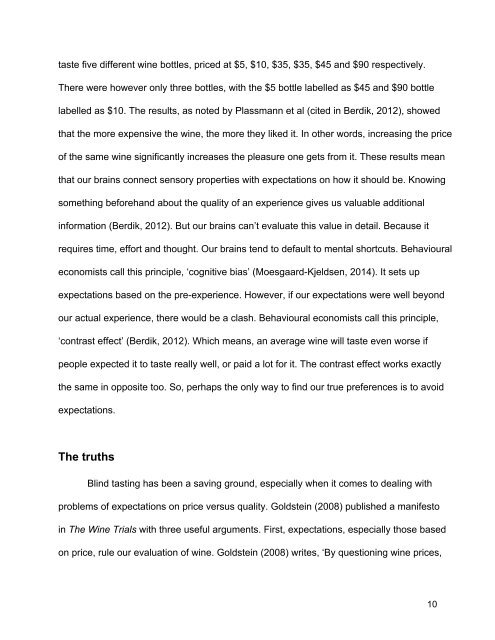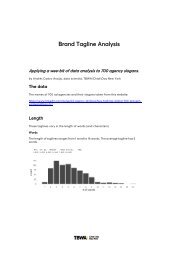The wine delusion
You also want an ePaper? Increase the reach of your titles
YUMPU automatically turns print PDFs into web optimized ePapers that Google loves.
taste five different <strong>wine</strong> bottles, priced at $5, $10, $35, $35, $45 and $90 respectively.<br />
<strong>The</strong>re were however only three bottles, with the $5 bottle labelled as $45 and $90 bottle<br />
labelled as $10. <strong>The</strong> results, as noted by Plassmann et al (cited in Berdik, 2012), showed<br />
that the more expensive the <strong>wine</strong>, the more they liked it. In other words, increasing the price<br />
of the same <strong>wine</strong> significantly increases the pleasure one gets from it. <strong>The</strong>se results mean<br />
that our brains connect sensory properties with expectations on how it should be. Knowing<br />
something beforehand about the quality of an experience gives us valuable additional<br />
information (Berdik, 2012). But our brains can’t evaluate this value in detail. Because it<br />
requires time, effort and thought. Our brains tend to default to mental shortcuts. Behavioural<br />
economists call this principle, ‘cognitive bias’ (MoesgaardKjeldsen, 2014). It sets up<br />
expectations based on the preexperience. However, if our expectations were well beyond<br />
our actual experience, there would be a clash. Behavioural economists call this principle,<br />
‘contrast effect’ (Berdik, 2012). Which means, an average <strong>wine</strong> will taste even worse if<br />
people expected it to taste really well, or paid a lot for it. <strong>The</strong> contrast effect works exactly<br />
the same in opposite too. So, perhaps the only way to find our true preferences is to avoid<br />
expectations.<br />
<strong>The</strong> truths<br />
Blind tasting has been a saving ground, especially when it comes to dealing with<br />
problems of expectations on price versus quality. Goldstein (2008) published a manifesto<br />
in <strong>The</strong> Wine Trials with three useful arguments. First, expectations, especially those based<br />
on price, rule our evaluation of <strong>wine</strong>. Goldstein (2008) writes, ‘By questioning <strong>wine</strong> prices,<br />
10




